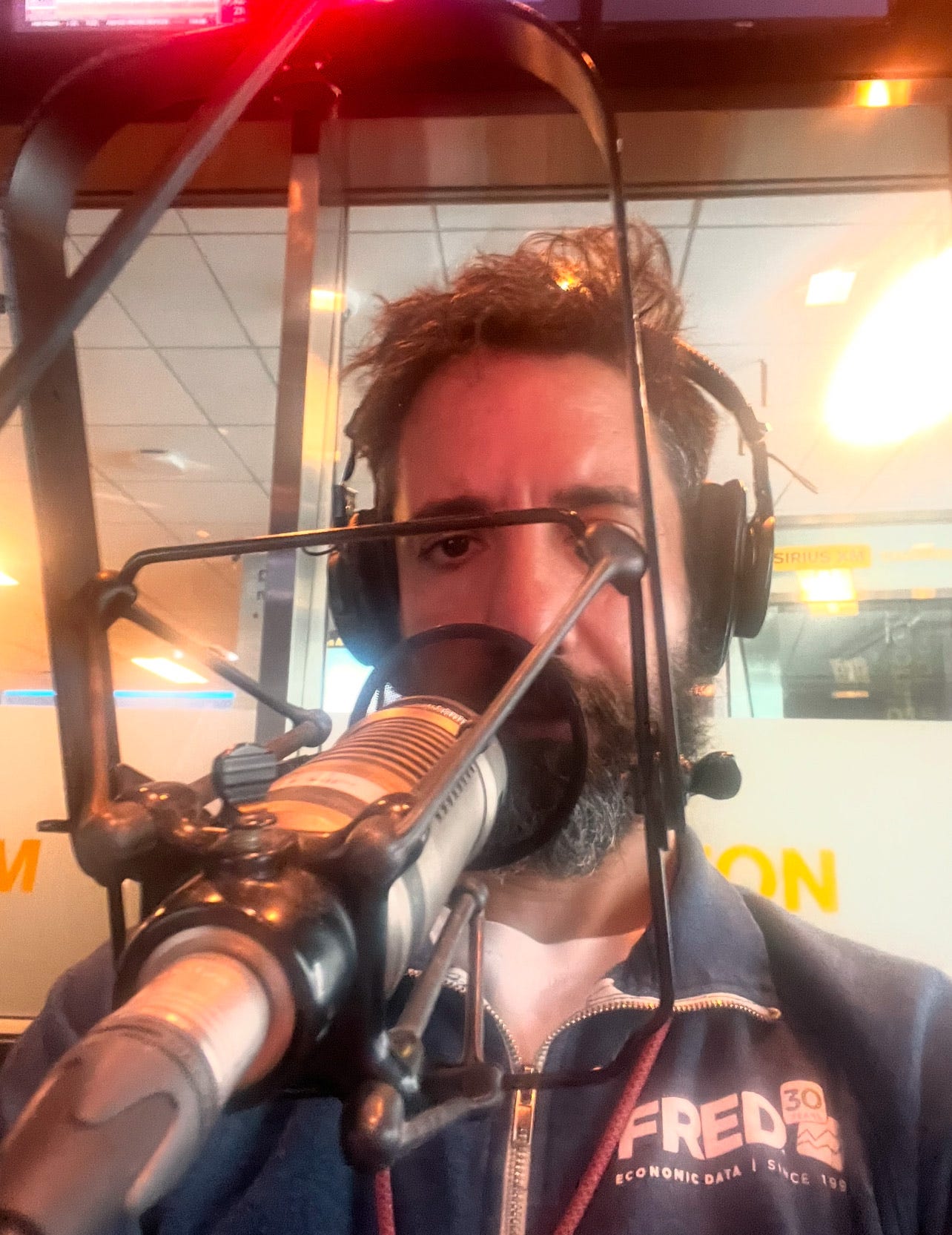Joe Weisenthal | December 23, 2024
The Monday Media Diet with Joe Weisenthal
On Steven Kotkin, ChinaTalk, and Guitar Tuner+
Tell us about yourself.
My name is Joe Weisenthal, and I’m the co-host of Bloomberg’s Odd Lots podcast, which I’ve been doing alongside Tracy Alloway for about 9 years. We cover anything we want within the broad realms of business, finance, and economics. It can be anything from trucking to semiconductors to the Fed. Just more generally, I’ve been a journalist covering all this stuff for roughly 16 years. I was one of the earliest employees of the Business Insider newsroom, having joined in late 2008, which was an amazing time to start a career covering markets. I’ve also been a TV host, an editor, and done your typical digital media stuff.
In addition to my job, I play in the country music band Light Sweet Crude, which has two all original EPs out.
Describe your media diet.
I know it’s weird, but I’m still hopelessly addicted to Twitter (or X) and it’s usually the first thing I look at in the morning. For fast-breaking financial market stuff, it’s still pretty good, but it’s not as good as it used to be. After that, I usually scan my work email, as well as the TOP page on the Bloomberg Terminal, which you can think of as kind of being a front page of a newspaper or website. It’s usually got the best mix of headlines that I’m looking for. Also for Odd Lots, we have an amazing community of listeners on Discord, with roughly 10,000 participants posting and talking about headlines in all kinds of categories from AI to China to defense to transport to crypto. And I scan that every morning, seeing what people are talking about. It’s hypocritical but I don’t listen to many podcasts. If I have a chance to tune people out and put on headphones, I’m listening to music.
What’s the last great book you read?
I recently finished reading Preface to Plato, by Eric Havelock, which is a book entirely dedicated to the question of “Why did Plato use the last book of The Republic to take a broadside against poets and poetry?” It honestly might have been one of the most satisfying books I’ve ever read. The basic gist is that poetry, as Plato was talking about, isn’t what we think of it today, but rather poetry (think: Homer) was the all-encompassing mode of moral, educational, and official instruction. Plato’s view was that the poetic form, which prized rhythm, memorization, and virality, imposed constraints on knowledge and analytics, and that to move forward philosophically, Greek society had to un-yoke itself from this mode of communication.
What are you reading now?
I’m currently reading the first volume Steven Kotkin’s biography of Stalin. Riveting stuff. Kotkin deplores tropes and cliches, and has a great balance of detail and writerliness.
What’s your reading strategy when you pick up a print copy of your favorite publication?
I can’t lie, I don’t read a lot of print these days. But at some point it occurred to me that when you pick up an old magazine, like a copy of LIFE or Newsweek from decades ago, our eyes are always drawn to the ads, rather than the articles (for whatever reason). So I got in the habit of scanning the ads more closely in print, figuring there’s a good chance that those will be what endures. I subscribe to Barron’s, and I love seeing what’s being promoted to investors at any given time. Are dividend strategies in? Is tech still being sold? What about REITs?
Who should everyone be reading that they’re not?
There’s a handful of Substacks that I actually read and pay for. Don’t Rock The Inbox by Marissa Moss and Natalie Weiner is a must-read for me, on country music. They write great, and also publish excellent curated playlists. ChinaTalk by Jordan Schneider is a must on all things economics and geopolitics, with respect to China. The Overshoot from Matt Klein is probably my favorite writing on macroeconomics. There’s other stuff that I read and pay for, like the newsletters from Emily Sundberg, John Ganz, and Max Read, but I think everyone’s reading them already.
What is the best non-famous app you love on your phone?
The Guitar Tuner+ app is very helpful. Pluck a string, and get a quick read on whether you need to tune it up or down.
Plane or train?
Usually plane, but if there’s a trip that makes a reasonable amount of sense to do by train – EG NYC to DC – I’ll use it. So much more peaceful, low stress.
What is one place everyone should visit?
Kuala Lumpur. Amazing food, beautiful architecture, not overrun by tourism. Just a great city.
Tell us the story of a rabbit hole you fell deep into.
I mentioned Preface to Plato before, but in general, I’ve gone through a multi-year rabbit hole of learning about the “Toronto School” of media communications. I’m typically not that big on academic theory, but there were a handful of thinkers (Walter Ong, Havelock, Marshall McLuhan) in the mid-20th century, many of them connected in some way to the Harold Innis at the University of Toronto who wrote brilliantly about how changes in media technology impact society and the human mind. It’s all extremely readable, and jargon free. And much of their writing does a good job of anticipating the cultural and political changes we’ve seen in the age of social media. My goal for 2025 is to get more friends to read Walter Ong’s Orality & Literacy in particular.
